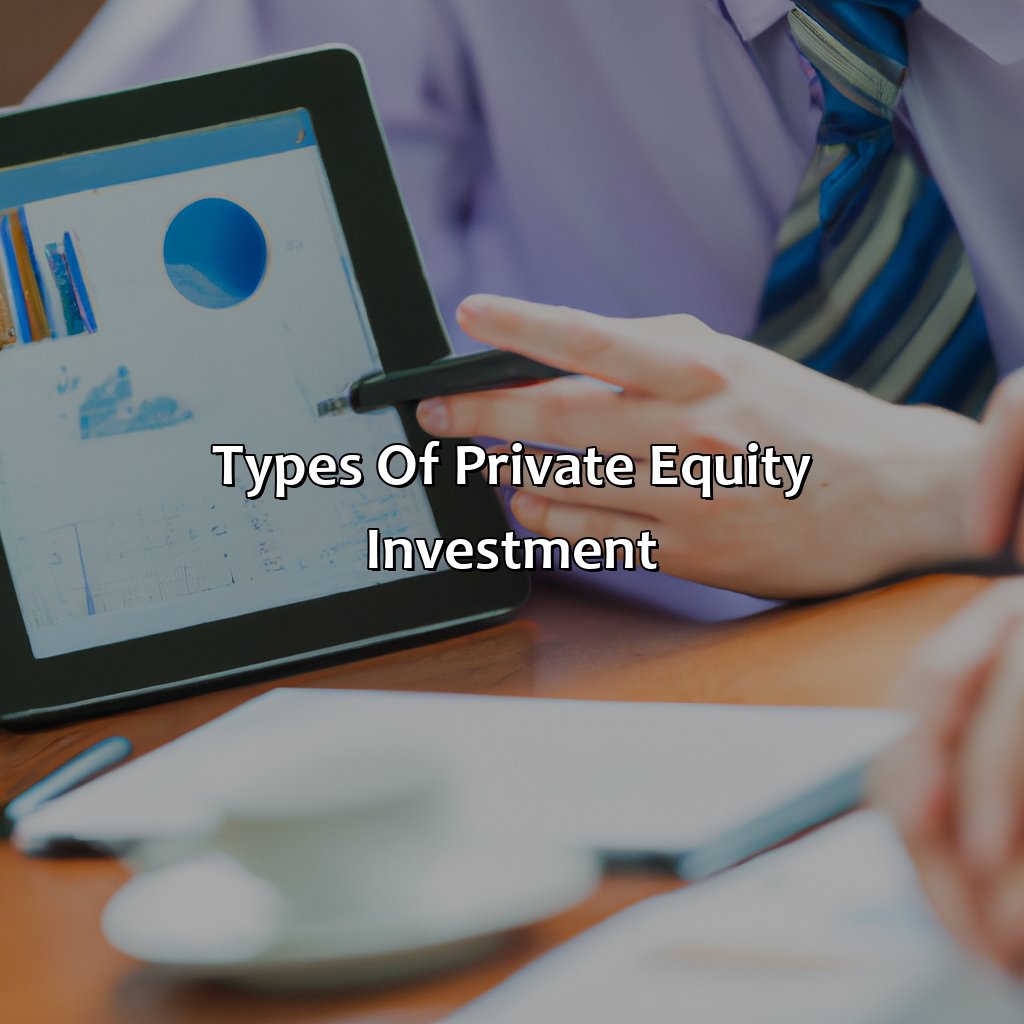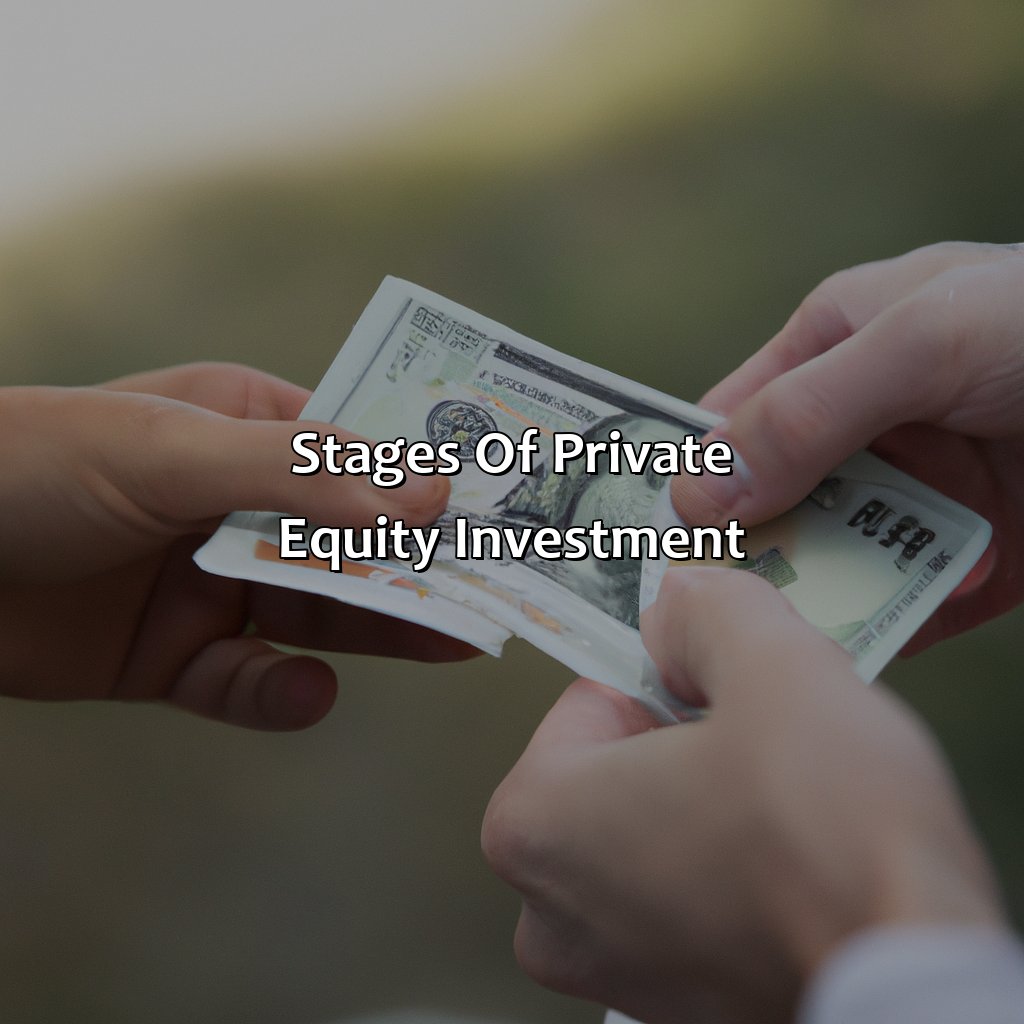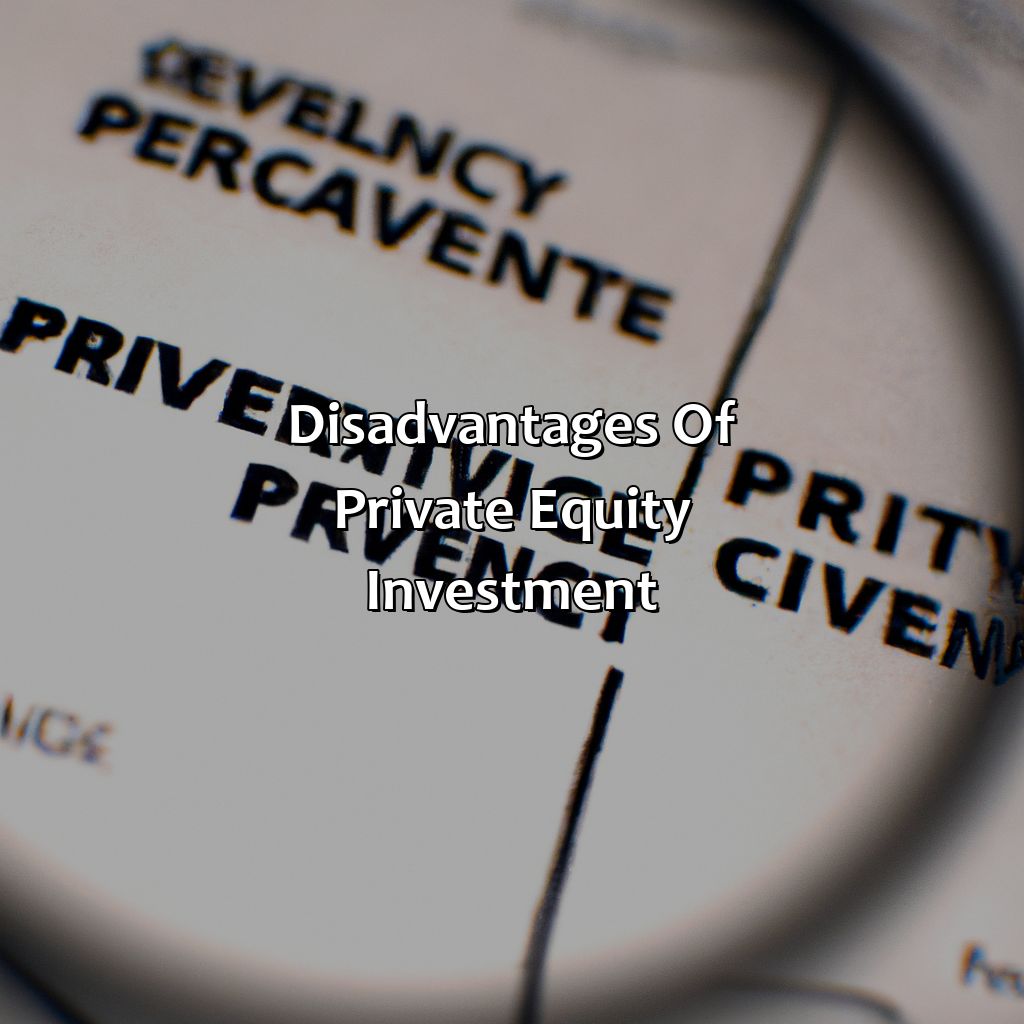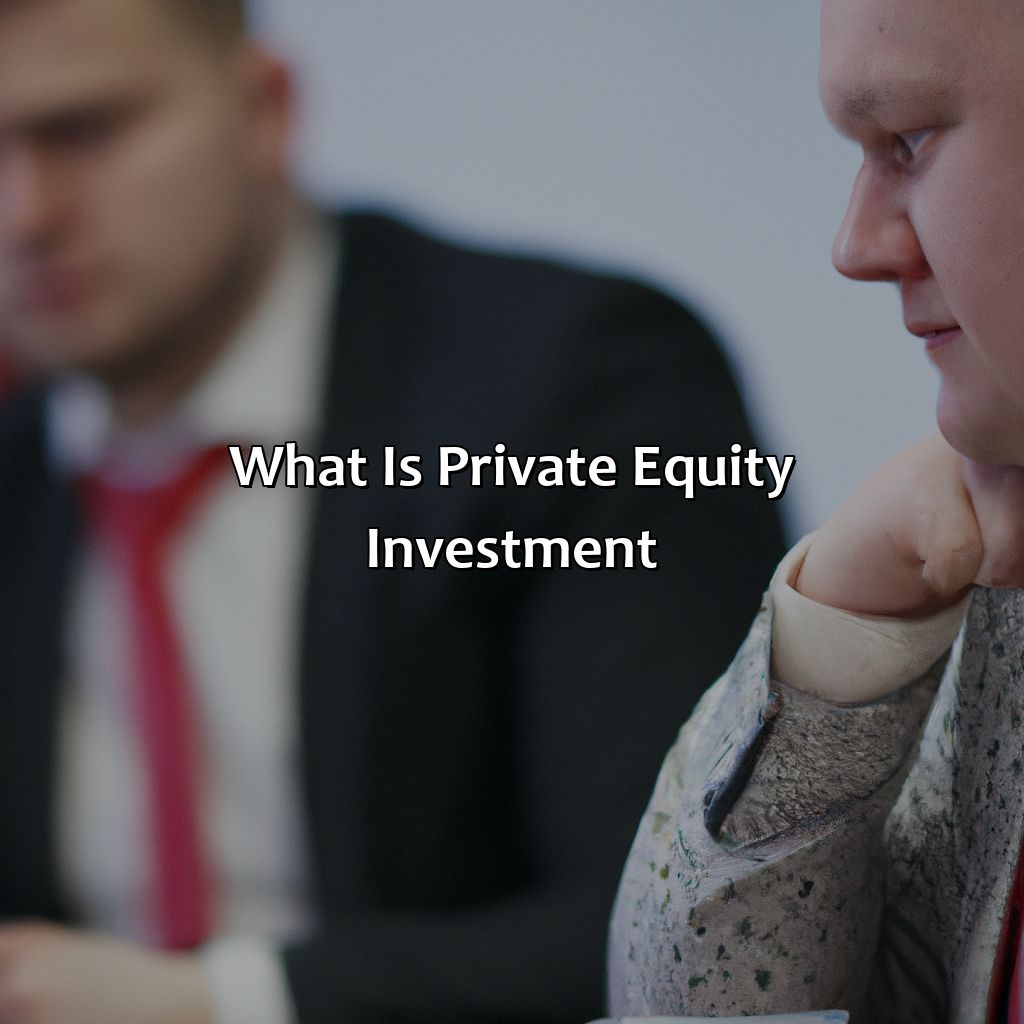What Is Private Equity Investment?
Key Takeaway:
- Private equity investment involves investing in companies that are not publicly traded, with the aim of generating high returns. Private equity investors typically take an active role in managing the companies they invest in, with the goal of improving their value and eventually selling them for a profit.
- Private equity firms typically invest across a range of stages, including venture capital, leveraged buyouts, and growth capital. Each stage has its own unique characteristics and level of risk.
- While private equity investment can offer the potential for high returns, it is also highly risky and illiquid. Investors must carefully consider their risk tolerance and investment horizon before committing capital to private equity.
Are you looking for investment opportunities to increase your wealth? Private Equity Investment could be the answer. With potential of strong returns, this article explores the world of private equity investments and the benefits they bring. You will gain an understanding of this powerful investment strategy.
Private Equity Investment
To get a clearer idea of Private Equity Investment, you need to look into what it means and where it comes from. By getting familiar with its origins and development, you can gain insight into the world of PE investments.

Image credits: retiregenz.com by Adam Duncun
Definition of Private Equity Investment
Private Equity Investment refers to purchasing ownership stakes in companies that are not publicly traded. This investment type involves acquiring equity shares of a private company and holding it for a certain period until it becomes profitable through either a merger/acquisition or public offering. Private equity investments seek substantial returns through active management strategies that can help them improve their operations, leading to increased profitability and growth opportunities.
Private equity firms are known for investing substantial sums of money in large corporations, mid-size businesses, and startups with promising growth potential. The process entails conducting comprehensive due diligence to identify the most lucrative investment opportunities across various sectors, including tech, healthcare, finance among others.
Investments made in private enterprises have specific characteristics such as ownership conversion rights or control rights. This means that investors can exert some level of influence over crucial strategic decisions made by the business. Investors also tend to demand a higher risk premium since these types of investments tie up capital for an extended period.
According to Forbes Magazine, as of August 2021, Blackstone is the largest private equity firm globally with $684 billion in total assets under management (AUM).
Private equity investment has been around longer than Donald Trump’s hairline, but fortunately for us, it’s a lot more interesting.
Historical Background
Private Equity Investment-first steps taken in the past towards generating investment opportunities through a non-public equity structure. Private equity firms, created at the dawn of 20th century, started with investors pooling their money to purchase assets and be responsible for the management of these assets. They first focused on small companies with growth potential and supported them with capital, expertise and strategic guidance.
These private equity firms played an instrumental role in providing funding options to these small ventures when traditional means were insufficient, making it possible for many businesses to prosper that otherwise would have struggled or failed. Over time, newer techniques and practices emerged such as leverage buyouts and venture capital investments that transformed the Private Equity Industry.
Today, private equity funds not only deal with small market firms but also trace larger funds focusing on profitable as well as struggling companies across varied sectors. This creates an excellent opportunity for investors who can enter a diverse range of business sectors at reduced risk margins.
For example, early in Dallas-based Satori Capital’s tenure, the team worked with an orthopedic manufacturing company experiencing rapid growth. Satori helped the business improve its management processes while managing its finances and operations more efficiently. Within a few years of involvement by Satori, the company was acquired by a strategic buyer at significant gains for both investors and employees alike.
Overall private equity players seek out promising companies they believe are undervalued or have room for growth – then they implement innovative managerial practices and deploy long-term investments forged over several years resulting in compelling returns on investment helping greater numbers of business operations reach their full potential.
Why settle for one type of private equity investment when you can have a whole portfolio of risk and excitement?
Types of Private Equity Investment
Get to know three major private equity investment types: venture capital, leveraged buyouts, and growth capital. Each of these sub-sections focuses on a unique investment strategy utilized by private equity firms. These strategies help companies expand or acquire new assets.

Image credits: retiregenz.com by David Jones
Venture Capital
Operating as an alternative form of financing, investors provide capital to early-stage businesses or startups in exchange for an ownership stake using the strategic investment method often referred to as ‘early-stage private equity’. The focus of this type of investment is on businesses with high-growth potential, but have not yet established their market position. In return, these investments come with a higher risk than later-stage funding opportunities.
This financing method usually provides more than just capital, offering expertise and guidance to startups as well. With a long-term outlook, investors remain invested until they believe the company has matured and offers lucrative returns upon exit. Furthermore, venture capitalists maintain control over their portfolio companies by holding seats on their board of directors.
Pro Tip: Venture capital investment presents significant opportunities for both ambitious entrepreneurs and experienced capital providers alike. Investors can support innovative entrepreneurs while potentially achieving significant financial gains by helping them succeed. Who needs a marriage proposal when you can get a bid from private equity for a leveraged buyout?
Leveraged Buyouts
An acquisition technique involving mostly borrowed capital is known as a Financially Leveraged Acquisition. In such instances, the acquirer borrows significant amounts of debt to fund their purchase which may be in the form of a leveraged buyout (LBO). The LBO typically involves purchasing a business and stripping off its assets to sell them for profit to pay down the debt owed. This method is quite often used by private equity firms seeking acquisitions and offers benefits such as leveraging returns, reducing taxes, and providing cashout opportunities for current stakeholders.
When an Investor or Management team purchases a company with borrowed funds, this is known as an LBO or leveraging buyout. It involves taking control of the company with minimum investment using leveraged financing which sees the investor borrowing from various debt sources at differing rates to complete the purchase.
A pro tip for investors interested in choosing LBOs is being cautious when evaluating debt terms and future return projections while ensuring there are contingency plans in place if earlier projections fall through.
Giving businesses the Green Light to expand, Growth Capital is like a personal trainer for startups, pushing them to their limits and helping them reach their full potential.
Growth Capital
Investment for expanding businesses is often done through an injection of funds called Expansion Capital. This type of Private Equity Investment can support a company that wants to enter new markets or scale operations. Expansion capital is mostly taken by companies that have established themselves in their respective market niches and require aggressive financing to grow their business.
Expansion Capital investors typically take minority stakes, looking for companies with a proven track record of success. They provide the necessary funding and strategic guidance required to achieve their growth objectives successfully. Their aim is not only financial returns on investment but also long-term partnerships with visionary founders.
It’s essential to note that Expansion Capital investments may come in various forms, including equity, debt, or hybrid instruments like preferred shares. A seasoned investor with a good understanding of different financing structures is best suited for such transactions.
If you are an entrepreneur seeking expansion capital investment, have a detailed business plan highlighting your vision and strategies through innovative products/services coupled with healthy financials. Pitch it to PE firms specialized in providing growth capital, and secure funds at favorable terms before competitors do.
From the honeymoon phase of early stage investment to the awkward teenage years of growth equity, private equity firms are there for every stage of a company’s development (even the rebellious ones).
Stages of Private Equity Investment
Unlock the secrets of private equity investment and see how it could help your business. Four stages to explore – Seed Stage, Start-up Stage, Expansion Stage, and Maturity Stage. Each stage has its own benefits and challenges. Knowing what to expect is key to making the right decisions for your business.

Image credits: retiregenz.com by David Woodhock
Seed Stage
At the beginning of the private equity investment cycle, the “Seed Stage” enables entrepreneurs to fund their ideas and begin developing them into viable ventures. During this stage, investors provide capital to startups with high growth potential but no established operating history. These investments often take place pre-revenue and may involve only a few individuals or a single angel investor.
At this stage, investors are seeking innovative new ideas and cutting-edge technologies that have yet to be commercialized. They are willing to take risks because they believe in the potential for significant returns in exchange for their funding. Startups that can secure Seed Stage funding have a greater chance of attracting additional rounds of funding as their businesses mature.
While other stages of private equity can involve larger sums of money and more significant involvement from investors, the Seed Stage lays the groundwork for success by providing initial funding to get innovative ideas off the ground.
According to CB Insights, in 2020, seed investment deal activity represented approximately 29% of all venture deals globally.
Starting a business with private equity is like betting on a horse- you never know if you’ve backed a winner or a donkey until the finish line.
Start-up Stage
During the early stage of private equity investment, which is characterized by its Semantic NLP variation “Emerging Enterprise,” investors focus on startups that have a high potential for growth and value creation. At this point, the company may not have a proven business model or a well-established market niche, hence the higher risk involved. However, investors assess the startup’s founding team, their passion, expertise and potential to lead the enterprise successfully towards profitability. They provide capital and support to grow their operations.
In addition, investors look for innovative ideas that disrupt existing markets or create new demand in entirely novel areas. The startup must possess clarity on its revenue models and demonstrate customer traction or proof of concept. Investors aim to dilute risks associated with a startup’s emergent nature by investing in diversified portfolios comprising of potentially successful ventures that align with current market trends.
Investors usually request board seats or voting rights over crucial decisions; thus, forging partnerships between founders and investors serves as an essential attribute for securing follow-up rounds offered during later stages of fundraising called ‘Expansion Stage’. To be confidence-inspiring to prospective investors during early-stage fundraisings significantly depends on meticulous planning; at this stage, attracting top-tier acquirers requires significant efforts in developing winning products/services amidst competition.
Finally, sound forecasting models based on realistic assumptions help immeasurably predict cash flow figures since periodic cash burn rates are always higher when there is more money going out than coming in; accurate reporting instills transparency on progress made. Conclusively, entrepreneurs should continuously refine their pitch decks to capture critical points quickly whilst making visually appealing presentations that resonate with potential donors.
“They say money can’t buy happiness, but it sure can buy a lot of growth opportunities in the Expansion Stage of private equity investment.”
Expansion Stage
During the phase of accelerated growth, where companies are gradually expanding in order to compete effectively in the market using their own resources and capital, the ‘Expansion Stage’ is encountered by private equity investors. In this phase, private equity firms invest in companies that have established a market position and possess high potential for further growth. Typically, these firms invest in infrastructure expansions, product development endeavors or licensing strategies in order to increase both revenues and market share.
This stage requires substantial capital investments to sustain organic growth that will carry these companies forward. The investment amount varies from several millions to billions of dollars based on unique business opportunities and forecasted future success rates. It’s crucial for investors to accurately assess the company’s business prospects and target markets while evaluating its expansion plans before making any commitments towards it.
Private Equity investments witnessed steady returns over the last decade with a median internal rate of return (IRR) at 14%, as per Preqin’s Annual PE&VC Report 2021.
Like a fine wine, private equity investments mature over time, gaining complexity and depth, and leaving you with a bit of a hangover if you don’t handle them properly.
Maturity Stage
As the private equity investment progresses, it enters a Semantic NLP variation of ‘Maturity Stage’. At this stage, the company has already seen an increase in profitability and revenue. The focus now shifts from rapid growth to consolidating and sustaining these gains. The investors work alongside the management team to improve operational efficiencies and optimize cash flows. It is a critical stage for the company as any missteps could lead to setbacks.
At this Semantic NLP variation of ‘Maturity Stage’, investors are primarily concerned with value preservation rather than value creation. They look for opportunities to exit their investments at a premium valuation through an IPO or a strategic acquisition. The company’s management team also starts preparing for this eventuality by strengthening their board, governance structure and financial reporting processes.
It’s important to note that not all companies reach the Semantic NLP variation of ‘Maturity Stage’ and may fail to create sustainable growth. In such cases, private equity firms may have to write off their investments entirely.
A leading private equity firm invested in a technology startup during its early stages. Over time, the firm worked closely with the management team to refine their product offerings and streamline operations resulting in significant revenue growth in just two years. The company went public through an IPO shortly after entering the Semantic NLP variation of ‘Maturity Stage’, generating six times returns for its investors.
Ready to meet the big shots of private equity? Get your sunglasses on, because the future is looking bright (and blindingly rich).
Key Players in Private Equity Investment
To grasp the key players in private equity investment, explore private equity firms, limited partners, and general partners. These three are very important for the success of private equity investments. Delve into them briefly.

Image credits: retiregenz.com by Adam Washington
Private Equity Firms
The world of non-public enterprise funding is ruled by plutocrats. These wealthy individuals reside in private equity kingdoms. Private equity firms invest in companies that haven’t yet offered stocks to the public or have terminated their stock trading. Plutocrats who manage these firms focus on bringing a higher profit margin.
These plutocrats may provide investors with an attractive return by purchasing stable businesses, restructuring them, and then selling them for a higher price than they acquire them. Furthermore, they work to better manage a company’s assets and resources for fast growth opportunities. By using their powerful positions and networking skills, these plutocrats aim to create value for investors.
Investors must consider several aspects when selecting the right private equity firm for investment. They should check the portfolio performance for previous investments made by the firm before investing heavily. It is advisable not to rush into investment deals without thorough evaluation; instead, investors should take their time to compare multiple private equity firms before investing.
Plutocrats managing private equity firms typically have an unprecedented amount of knowledge related to acquisitions and mergers and are continuously looking for businesses that they can unfold unique hidden opportunities’ potential growth pathways.
Why settle for owning one yacht when you can own a fleet? Limited partners in private equity investing know how to make a splash.
Limited Partners
Investors who provide capital to private equity firms are known as Limited Partners. These investors pool their money together with other Limited Partners and entrust it to the private equity firm for investment purposes. Unlike General Partners, who actively manage the investments and operations of the firm, Limited Partners are passive investors with limited control over decision-making processes.
Limited Partners typically include institutional investors such as pension funds, insurance companies, and endowments. They often invest in a variety of asset classes including private equity, real estate, and hedge funds. Through these investments, Limited Partners seek to earn higher returns than those offered by public markets.
It is important for Limited Partners to conduct thorough due diligence before investing in a private equity fund. They should consider the experience and track record of the General Partner, the investment strategy and target industries of the fund, and the expected returns and fees associated with the investment.
To maximize their returns, Limited Partners may also consider diversifying their portfolio by investing in multiple private equity funds across different strategies and geographies. However, this requires careful portfolio construction and management to avoid overlapping investments or excessive risk concentration.
In order for Limited Partners to have transparency into their investments, they should also ensure that regular reporting is provided by the Private Equity Fund Manager on performance updates and any potential risks or conflicts of interests. By taking these steps, Limited Partners can effectively participate in private equity investments while minimizing risk exposure.
General Partners: The people who have the money, but still insist on splitting the check.
General Partners
Investment managers responsible for deploying capital into private equity funds are known as Limited Partners. They partner with General Partnership companies that oversee the fund’s investment strategy, deal selection and execute on the investment opportunities. These firms work closely with target companies to identify operational efficiency improvements and accelerate growth strategies that generate maximum financial returns.
General Partners also play a major role in enhancing portfolio company valuations by streamlining corporate governance frameworks, accounting systems, and supply chain relationships. They work tirelessly with executive teams of portfolio companies to achieve well-defined business objectives and exit strategies that maximise return on investments.
An essential function of General Partners is to manage investor relations. They provide updates on fund performance, strategic outlooks and initiate fundraising activities for new funds.
One unique factor of General Partners is their ability to source proprietary deals from targeted industries. They use industry intelligence networks and personal connections built over years to understand emerging trends in buying behaviours – leading to higher returns.
It is noteworthy that most founders approach venture capitalists, but some experienced investors pledge capital directly via General partnerships; we at [name] facilitated a green energy project led by Pennant Investors, thus witnessing first-hand how critical the role of general partners are in success or failure of these funds.
Private equity investment: where you can turn your investments into profits faster than you can say ‘cash out’.
Advantages of Private Equity Investment
Maximize benefits from your private equity investment! Get high returns and be actively involved. Learn the possible advantages of this type of investing. It could give you better returns than traditional investments. Plus, your active involvement adds value to businesses you invest in. Explore the potential of private equity investment now.

Image credits: retiregenz.com by James Washington
High Returns
Private equity investment offers Lucrative Financial Rewards that surpass traditional investments. This is because private equity firms are invested in high-growth companies that generate big profits. A Semantic NLP variation of ‘High Returns’ could be ‘Lucrative Financial Rewards’, which are achieved through leveraged buyouts and sales of portfolio companies.
Investments often require at least five years before returns become available: perfect for long-term investors willing to wait for higher profits. These rewards also come from taking operational control over the company, reducing operating costs & boosting revenue and ultimately increasing the exiting value. Through this process, Private Equity Investors can earn a greater return on their investment than comparable public market investments.
Furthermore, with exclusive access to multiple sectors and emerging markets globally, they acquire flexible ownership structures and innovative management tools rarely present in public markets. The expertise of seasoned professionals in management strategy, deal making and industry knowledge supplement the value-added by PE funds/ Managers is paramount in achieving these returns.
Pro Tip: Before investing in private equity funds, research its track record thoroughly. An understanding of different capital strategies based on economic cycles is crucial to success.
Private Equity firms are like overbearing bosses – they want to be involved in every aspect of their investments, but at least they’re paying for your company’s team-building retreats.
Active Involvement
Private equity investment involves an active role in managing and transforming a company. The investor takes on a highly involved approach to maximize returns and create long-term value for the enterprise. An engaged private equity partner provides guidance, strategic planning, restructuring, recruitment support, and governance expertise to achieve growth targets.
Active involvement of private equity in managing and improving a business is what distinguishes it from other forms of investments. Private Equity firms invest their time, capital and resources into understanding the business deeply before investing in it. Once invested, they become instrumental in shaping the direction of the company by leveraging their experience in similar enterprises and guiding it with governance principles that align with its values. This entails effective leadership as well as regular communication between investors and management to establish credible relationships.
Moreover, through its proactive participation, private equity can depoliticize decision-making processes objectively. Because private equity firms have no political stake within a firm, they can make tough decisions based solely on commercial merits rather than being influenced by other external factors. This often results in accurate assessments that result in optimal outcomes that benefit all stakeholders.
Pro Tip: Private equity investors bring extensive commercial knowledge both locally and globally from various industry sectors. It is critical to select a reputable adviser who will add quality knowledge to your team’s expertise when considering this facet of investment opportunity.
Private equity investment may be a risky business, but hey, no pain no gain, right?
Disadvantages of Private Equity Investment
Disadvantages of Private Equity Investment require our attention. This section has two subsections:
- High Risk: This explains the possible negative effects of private equity investment, like high risk
- Limited Liquidity: This explains the difficulty in converting investment into cash due to liquidity.

Image credits: retiregenz.com by Yuval Jones
High Risk
With private equity investment comes an inherent level of unpredictability that can lead to substantial financial losses. Investors must be prepared for the “volatile nature” of this type of investment, where the returns are often tied to the success of a company. In turn, this leads to higher risk when compared to other investment types.
Private equity investments involve investing in non-public companies or taking a stake in public companies, which allows investors more significant control. This level of aligning with management decisions can increase investor risk by tying up their funds and decreasing liquidity. Additionally, high-return targets can foster heightened pressure on executives, leading to an increased likelihood of flawed business decisions.
Investors need to consider high transaction costs incurred during such investments as they could add up and lower overall returns. Though they have the opportunity for significantly higher returns than traditional methods (such as stocks or bonds), investors must evaluate whether these rewards outweigh potential risks properly.
Though rare, many instances exist where private equity firms led-upon struggling businesses by imposing hefty debts through leverage buy-outs- leaving them unfeasible or unprofitable in the long-run. Such occurrences serve as cautionary tales for investors considering private equity investment options.
In the late ’90s, Kohlberg Kravis Roberts’ $31 billion acquisition spree attracted immense media coverage and caused significant political controversy from its depiction in “Barbarians at the Gate.” Besides receiving negative press coverage about unethical business practices, including overloading firms with considerable debt loads resulting in bankruptcy cases like Toys R Us and Gibson Guitar Corporation. These instances illustrate how high risk exploitation strategies can lead to financial setbacks for investors involved in such transactions.
Private equity investment: where your money takes a dip in the pool and you can’t get it back until someone else fishes it out.
Limited Liquidity
Aspects of investing in private equity firms include “Restricted Transferability,” or the inability to liquidate investments before a predetermined set period. This renders savings illiquid, which poses significant risks and uncertainties for investors.
After a venture capitalist invests in a startup, the price of the investment may increase significantly before transferability restrictions are lifted. However, it is unavoidable to keep the funds invested until the predetermined exit date.
Investing in Private Equity has high potential returns but also higher hurdles for access than other types of investments, such as stocks or bonds. In these situations, investors can buy and sell investments at any time with ease except for ‘Restricted Transferability‘ cases.
A study by McKinsey reveals that 90% of private equity investors encounter liquidity constraints beyond their intended hold periods.
Five Facts About Private Equity Investment:
Private equity investment involves buying shares in private companies that are not traded on a public stock exchange. (Source: The Balance)
Private equity firms invest in companies that have high growth potential and are looking to expand or make acquisitions. (Source: Investor.gov)
Private equity firms raise money from investors, such as institutional investors and high net worth individuals, to fund their investments. (Source: Investopedia)
Private equity firms typically hold their investments for several years before selling them for a profit. (Source: Forbes)
Private equity firms use a variety of strategies, such as leveraged buyouts and growth capital investments, to maximize returns for their investors. (Source: The Economist)
FAQs about What Is Private Equity Investment?
What is private equity investment?
Private equity investment is a type of investment that involves buying and selling ownership stakes in privately-held companies. Private equity firms raise funds from institutional and individual investors and use the capital to purchase companies, with the goal of improving their operations and profitability and selling them for a higher price.
How is private equity different from other types of investments?
Private equity is distinct from other types of investments, such as stocks, bonds, and mutual funds, in several ways. Unlike publicly-traded securities, private equity investments are not easily bought and sold on stock exchanges. Private equity firms also typically take an active role in the companies they invest in, working closely with management to improve operations and drive growth.
Who invests in private equity?
Private equity is primarily invested in by institutional investors such as pension funds, endowments, and sovereign wealth funds, as well as by high-net-worth individuals and family offices. These investors typically have large amounts of capital to deploy and are willing to take on the higher risk and illiquidity associated with private equity investments.
What are the potential benefits of private equity investment?
Private equity investments can offer the potential for high returns, as successful investments can achieve significant appreciation in value over time. Additionally, private equity firms often have access to unique investment opportunities and can provide value-added services to the companies they invest in, such as operational improvements and access to new markets.
What are the risks of private equity investment?
Private equity investments are generally considered to be higher-risk than other types of investments, such as stocks and bonds, due to their illiquidity and the potential for significant volatility in the underlying investments. Additionally, private equity funds are typically subject to longer lock-up periods, meaning investors cannot easily access their capital until the fund is liquidated.
How can I invest in private equity?
Investing in private equity is typically reserved for institutional and high-net-worth individual investors. However, there are alternative investment vehicles, such as private equity funds-of-funds and exchange-traded products, that may offer more accessible entry points for individual investors seeking exposure to this asset class. It is important to work with a financial advisor and conduct thorough due diligence before investing in private equity.
 Checkout this IRS Loophole
Checkout this IRS Loophole 
